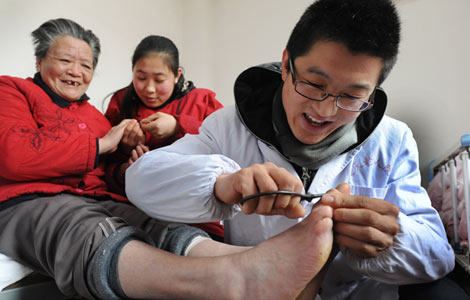Top universities face exams for corruption
Updated: 2013-12-23 07:34
By Tang Yue and He Na in Beijing (China Daily)
|
|||||||||
|
 |
Institutes hit by allegations as education leaders resign, report Tang Yue and He Na in Beijing.
Three years ago, Renmin University of China made national headlines when it became the first college in the country to offer a master's degree in anti-corruption studies.
Last month, the university was in the news again, but for less welcome reasons. Cai Rong-sheng, head of student admissions at Renmin - one of China's most prestigious educational establishments - was detained as he attempted to flee the country.
While the investigation into Cai continues, two weeks ago another high-profile figure, An Xiaoyu, vice-president of Sichuan University, the most respected college in southwestern China, was reported to be under investigation following allegations of corruption related to the construction of a new campus.
As China's leaders extend the scope of an anti-corruption campaign that saw Vice-Minister of Public Security Li Dongsheng come under investigation last week, the ivory towers have not proved immune. At least five university presidents have stepped down this year alone after being investigated on corruption charges.
The investigations into university leaders may just be the tip of a corruption iceberg in the education sector and the issue could prove costly for China in the long run, according to experts.
"The problems on the campuses have not been the main focus of anti-corruption work during the past few years, but judging by recent events, the problem is serious. Further cases are very likely to come to light if the investigation is intensified," said Ren Jianming, director of the Clean Governance Research and Education Center at Beihang University in Beijing.
University officials may be small fry compared with high-ranking officials in government and State-owned enterprises in terms of the money involved, but their corruption is of a type unique to academic institutions - mainly centered around student enrolment and the allocation of research funding - which could have a direct impact by hampering social mobility and slowing the pace of innovation, the experts warned.
In China, gaining admission to a first-tier college can be a life-changing opportunity for students from humble backgrounds, which means misconduct in the admissions process poses a fundamental danger to social justice, said Ren.
"It may even have a negative influence on the students' own values because university is a crucial time, and one during which many of them learn their values for life," said Guo Yong, vice-director of the Clean Governance Research and Education Center at Tsinghua University.
Most Viewed
Editor's Picks

|

|

|

|

|

|
Today's Top News
Committee of 100 seeks to tackle 'sensitive' images about China
IPR courts 'would be helpful'
GM corn rejection no to hurt market
Liaoning's combat capability tested
Sotheby's denies $8m work is fake
Castro urges US to respect differences with Cuba
Student wounded in school shooting dies
US aircraft hit by gunfire in S. Sudan
US Weekly

|

|















